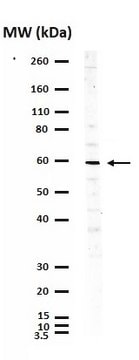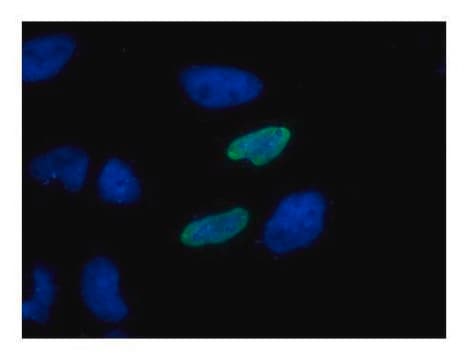SAB2702192
Monoclonal Anti-Myc tag antibody produced in mouse
clone GT0002, affinity isolated antibody
Szinonimák:
Anti-Myc Tag Antibody
About This Item
IP
WB
indirect immunofluorescence: suitable
western blot: 5000-20000
Javasolt termékek
biológiai forrás
mouse
Minőségi szint
konjugátum
unconjugated
antitest forma
affinity isolated antibody
antitest terméktípus
primary antibodies
klón
GT0002, monoclonal
Forma
buffered aqueous solution
koncentráció
1mg/mL
technika/technikák
immunoprecipitation (IP): suitable
indirect immunofluorescence: suitable
western blot: 5000-20000
izotípus
IgG1
kiszállítva
wet ice
tárolási hőmérséklet
−20°C
célzott transzláció utáni módosítás
unmodified
Immunogén
Alkalmazás
Tulajdonságok és előnyök
Egyéb megjegyzések
Fizikai forma
Jogi nyilatkozat
Nem találja a megfelelő terméket?
Próbálja ki a Termékválasztó eszköz. eszközt
javasolt
Tárolási osztály kódja
12 - Non Combustible Liquids
WGK
nwg
Lobbanási pont (F)
Not applicable
Lobbanási pont (C)
Not applicable
Válasszon a legfrissebb verziók közül:
Analitikai tanúsítványok (COA)
Nem találja a megfelelő verziót?
Ha egy adott verzióra van szüksége, a tétel- vagy cikkszám alapján rákereshet egy adott tanúsítványra.
Már rendelkezik ezzel a termékkel?
Az Ön által nemrégiben megvásárolt termékekre vonatkozó dokumentumokat a Dokumentumtárban találja.
Az ügyfelek ezeket is megtekintették
Tudóscsoportunk valamennyi kutatási területen rendelkezik tapasztalattal, beleértve az élettudományt, az anyagtudományt, a kémiai szintézist, a kromatográfiát, az analitikát és még sok más területet.
Lépjen kapcsolatba a szaktanácsadással













